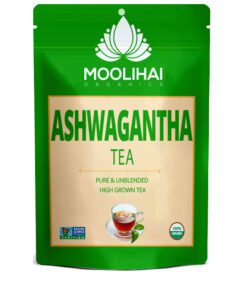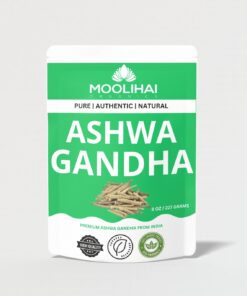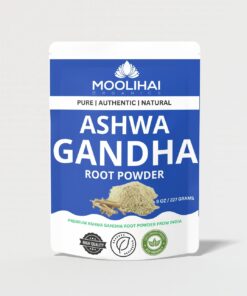Info
Proven Health Benefits of Ashwagandha For Men & Women (Withania Somnifera)

Ashwagandha is a perennial herb belonging to the botanical genus Withania Somnifera. This remarkable plant has been used for thousands of years in Ayurvedic medicine, primarily as a Rasayana, which means it rejuvenates the body. Ashwagandha is recognized globally as an adaptogenic herb and serves as a powerful tonic to help combat the psychological and physiological stresses experienced due to daily life changes. Since ancient times, it has also been valued for its supportive role in various body systems, including the reproductive, immune, and thyroid systems, as well as in enhancing fertility.
Common Names of Ashwagandha
Botanical Name: Withania Somnifera
Common Name: Indian Ginseng, Winter Cherry, Ashwagandha
Tamil Name: அமுக்காரன் கிழங்கு / Amukkaram kizangu
Malayalam Name: അശ്വഗന്ധ റൂട്ട് / Amukkuram
Hindi Name: अश्वगंधा जड़ / Asgandh, Punir
Telugu Name: అశ్వగంధ రూట్ / Pennerugadda, Pulivendram
Bengali Name: Asvagandha
Gujarati Name: અશ્વગંધા મૂળ / Aasandha, Ghoda Aakun
Kannada Name: ಅಶ್ವಗಂಧ ಮೂಲ / Ashwagandha, Kiremallina gida
Marathi Name: अश्वगंधा मुळ / Asagandha, Askandha tilli
Urdu Name: اشواگنڈھا جڑ / Asgand
History of Ashwagandha

A curious fact about Ashwagandha is that its name derives from Sanskrit rather than Tamil. Translated, “Ashwagandha” means “the smell of a horse” (where Ashwa means horse and Gandha means perfume). This herb is renowned for providing stamina and strength, promoting vitality in both male and female nervous and reproductive systems.
The botanical name of this herb, Withania Somnifera, reflects its qualities—”Somnifera” translates to “to induce sleep,” underscoring Ashwagandha’s ability to foster deep, restorative sleep, thus energizing the body and cultivating a peaceful mind.
Ashwagandha is also known by various other names. Because it produces small red berry-like fruits, it may also be referred to as “Winter Cherry” or Poison Gooseberry.
Moreover, the name “Indian Ginseng” could lead one to believe it is related to ginseng. However, this is a misnomer, as Ashwagandha is not related to that family; it was named for its impressive energy-boosting qualities.
What is Ashwagandha ?

Ashwagandha is an annual perennial herb in the Nightshade and Solanaceae families, the same family as potatoes and tomatoes.
Native to the Middle East, North Africa, and India, Ashwagandha has adapted well and is now cultivated in temperate climates around the world, including regions like the United States.
This resilient herb thrives in a variety of soil types, including subsoil, alkaline, dry, and wet environments. Unlike many tropical plants that struggle with intense sunlight, Ashwagandha flourishes even in severe conditions.
The shrub typically grows up to 3 feet tall, displaying silvery-gray stems covered with fine hair. Its leaves are oval-shaped and dull green, measuring about 10-12 cm in length.
Ashwagandha produces star-shaped yellow-green flowers, which grow about half an inch in length. Upon ripening, its small, berry-like fruits turn orange-red, encased in a papery calyx that provides protection.
While both the leaves and berries possess considerable medicinal benefits, the roots are the most revered and widely utilized in herbal preparations.
Ashwagandha Benefits

Ashwagandha finds extensive use in Ayurvedic medicine for its ability to rejuvenate the body while enhancing, supporting, and toning various functions. One of its remarkable traits is its dual capacity to calm and stimulate the body and nervous system, making it a favorite ingredient in numerous medications worldwide. Scientific research also substantiates the herb’s benefits across various conditions. Let’s explore some key areas where Ashwagandha can make a difference.
Alleviating Stress and Anxiety
Stress from various sources can lead to exhaustion, sleep difficulties, and escalating hyperactive symptoms. Research has discovered that Ashwagandha offers a calming effect comparable to traditional anxiety medications.
This herb enhances the body’s capacity to handle psychological stress, promoting restorative sleep at night, and helping maintain energy levels throughout the day.
A notable 2019 human study demonstrated Ashwagandha’s efficacy in reducing anxiety. The research divided participants into two groups: one consumed 250mg of Ashwagandha daily, while the other received a placebo. Results indicated that Ashwagandha participants experienced a significant reduction in cortisol levels, the hormone primarily responsible for stress and anxiety, highlighting the herb’s potential to help alleviate these concerns.
Read also: Best Ashwagandha Supplements for Stress Relief
Support for the Nervous System
Ashwagandha protects against complex issues, providing nourishment and energy that ultimately support a healthy nervous system. Contrary to some beliefs, this herb effectively alleviates stress without any adverse effects on the body.
Incorporating this herb or any preparations made from it can naturally alleviate stress and tension, leading to overall wellness throughout the body.
Relief for Arthritis
Ashwagandha boasts anti-inflammatory properties that serve as natural pain relievers. A 2015 study involving 125 participants revealed that this herb could successfully treat rheumatoid arthritis and provide relief from joint pain.
Read also: Benefits of Ashwagandha for Skin
Heart Health Booster
Ashwagandha is believed to improve heart health by lowering blood pressure, alleviating chest pain, stabilizing cholesterol levels, and preventing heart diseases. While research supporting these claims is scarce, a 2015 study suggested that Ashwagandha root extracts could enhance cardiorespiratory endurance—thus contributing to better heart health. However, further investigation is warranted to substantiate this claim.
Ashwagandha Benefits for Men
This herb is a natural enhancer for reproductive health, as studies have indicated its significant effects on testosterone levels. Ashwagandha has been shown to enhance sperm count in men leading to increased fertility.
In a study of 75 infertile men, those who consumed Ashwagandha daily experienced increased sperm count, improved quality, and overall fertility. Remarkably, researchers also noted elevated antioxidant levels in their blood.
Another research project indicated that Ashwagandha can help reduce stress, consequently enhancing sperm quality. At the end of a three-month treatment period, 14% of the men whose partners had undergone treatment became pregnant—a remarkable outcome.
In summary, Ashwagandha effectively boosts testosterone levels, making it a beneficial addition for those looking to enhance fertility.
Read more: Health Benefits of Ashwagandha for Men
Ashwagandha Benefits for Women
Stress is a significant factor in maintaining hormonal balance in the reproductive system. When these hormones become unbalanced, issues such as infertility, diminished libido, and difficulty conceiving may arise, as well as disruptions to a healthy menstrual cycle.
Ashwagandha plays a crucial role in stress reduction, thereby supporting reproductive health. Rich in minerals, it enhances communication within the endocrine system, reduces cortisol levels, and strengthens adrenal glands.
Furthermore, Ashwagandha stimulates increased blood production, which is vital for maintaining a healthy menstrual cycle. Balanced hormones and improved blood flow can have positive effects on libido, significantly aiding in fertility.
A study conducted in 2015 investigated how Ashwagandha supports women facing sexual dysfunction. Participants receiving regular doses reported experiencing more orgasms, heightened satisfaction in sexual activities, and reduced stress levels.
For those encountering difficulties conceiving, incorporating Ashwagandha may hold the key to balancing reproductive hormones and enhancing fertility.
Also read: Benefits of Ashwagandha for Hair
Other Benefits of Ashwagandha
The natural medicinal properties of Ashwagandha complement its rejuvenating and toning abilities, making it a crucial herb utilized in various medicinal preparations. Among its many benefits are:
- Strengthens the immune system and promotes overall health.
- Supports the healthy functioning of adrenal glands.
- Encourages deep and restorative sleep patterns.
- Aids in the healthy growth of muscles and the treatment of musculoskeletal disorders.
- Provides lasting energy and enhances various bodily functions.
- Supports reproductive health for both men and women.
- Reduces stress levels and calms psychological processes.
- Maintains healthy thyroid function and overall wellness.
- Fosters healthy joint and spine development across all ages.
Research about Ashwagandha

Numerous researchers are increasingly intrigued by Ashwagandha due to its renowned and varied medicinal benefits. The prevailing consensus is that Ashwagandha provides several rare yet proven advantages.
- Radiation therapy or chemotherapy can adversely affect the immune system; studies have indicated that Ashwagandha effectively supports immune function.
- Ashwagandha plays a role in regulating healthy cholesterol levels while amplifying antioxidant properties. This includes collaborative effects with other beneficial herbs such as Sesame seeds (Sesamum Indicium), Shatavari (Asparagus Racemosus), licorice (Glycyrrhiza Glabra), and Safed Musli (Chlorophytum Borivillanum).
- Research heavily focuses on Ashwagandha’s stress-relieving qualities, demonstrating its adaptogenic properties that efficiently alleviate both psychological and physiological stress while supporting cognitive functions.
- The studies targeting Ashwagandha’s reproductive qualities predominantly included male subjects, confirming the herb’s ability to enhance vitality, energy, and fertility.
- Additionally, Ashwagandha has demonstrated supportive effects for muscle mass recovery and general dietary requirements for sustained health.
A variety of successful studies have been conducted on Ashwagandha, and while this overview only touches upon a few, many others delve into its extensive benefits. Keep exploring to find out more!
Ashwagandha Uses

Ashwagandha is considered an exceptionally versatile herb. Traditionally consumed in its leaf form, today it is available in various preparations, including tablets, liquids, powders, or as an ingredient in dishes.
One of the herb’s distinct advantages is that it can be taken at any time of the day—morning, night, before meals, or after meals. The extract and powder are flavorful and easily integrated into culinary recipes, making Ashwagandha a delightful addition to your diet.
Despite its numerous health benefits, it is advisable to consult a healthcare provider before beginning regular consumption. Traditional use involves drying the leaves in sunlight and grinding them into powder form.
Mixing this powder with water, honey, or hot milk consumed before bedtime is particularly effective for calming the Vata dosha. Regular use of this mixture supports reproductive health, boosts body strength, and results in improved sleep patterns.
Consuming equal amounts of honey or ghee alongside Ashwagandha enhances overall nutrient absorption and imparts a refreshing sensation. These combinations also serve as ideal mediums for delivering nutrients deep into bodily tissues.
It is crucial to note that combining equal quantities of honey and ghee with Ashwagandha can lead to toxicity; hence, ensure that they are not of equal weight. During the summer months, using raw sugar as a substitute for honey serves as a beneficial alternative.
Mixing Ashwagandha with raw sugar is particularly effective for women’s reproductive health and for addressing joint-related issues.
Ashwagandha Tonic Recipe
Ingredients:
- Ashwagandha powder – 1 to 2 teaspoons
- Milk – 2 cups
- Raw sugar – 1 tablespoon
- Cardamom – ⅛ teaspoon
Procedure: To prepare the tonic, boil 1 or 2 teaspoons of Ashwagandha powder in 2 cups of milk over low heat for about 15 minutes. After 15 minutes, add ⅛ teaspoon cardamom and 1 tablespoon raw sugar, then mix well and turn off the heat after two more minutes. Enjoy this tonic once or twice daily for refreshing relief from various ailments.
Ashwagandha Tea Recipe
Ingredients:
- Ashwagandha powder – ½ teaspoon
- Hot water – 1 cup
- Honey – 1 teaspoon
Procedure: Making Ashwagandha tea is a simple process. Add ½ teaspoon of Ashwagandha powder to a cup of hot water and stir well. Let the mixture sit for a few minutes to allow the extracts to infuse. Finally, sweeten with 1 teaspoon of honey to taste. This tea, unlike other coffee or teas, does not have chicory and serves as a rejuvenating and refreshing booster for your body.
Read more: Health Benefits of Ashwagandha Tea
Ashwagandha Rearing System
When acquiring Ashwagandha products, including plants or seeds, it is crucial to assess their value, quality, cost, supplier reliability, and environmental impact during cultivation.
Where is Ashwagandha Grown?
Ashwagandha, native to India, thrives in tropical, subtropical, and arid regions due to its low water requirements. It is predominantly cultivated in the arid areas of North Karnataka, as well as in states such as Haryana, Rajasthan, Gujarat, Punjab, Maharashtra, Uttar Pradesh, and Madhya Pradesh.
Given the limited variety of crops and challenging agricultural conditions, farmers in these regions depend less on irrigation, as the Ashwagandha plant flourishes with minimal water and maintenance.
How to Maintain the Ashwagandha Plant from Seed to Harvest
Before planting Ashwagandha, ensure that the seeds you are using are certified. Equally vital is to guarantee that your soil meets organic certification standards—nurturing both seed and soil quality is essential for successful cultivation.
To uphold organic integrity, eliminate the use of pesticides, synthetic fertilizers, and other harmful chemicals throughout your farming practices.
The final product’s quality heavily relies on how and where the herb is cultivated; hence, cultivation practices can greatly influence both your expenses and yields.
Ashwagandha is typically sown at the beginning of the rainy season, and while it requires less water, it matures and is ready for harvest within five months. Spacing the plants adequately during cultivation affects their shape, root thickness, and fiber quality.
If seedlings are prematurely harvested or planted too close together, their growth may be incomplete, leading to lower yields.
Precise distances between seedlings are imperative; otherwise, wide spacing or delayed harvesting can result in roots that are too thick, complicating the production of a balanced powder.
Sustainability in Action & Fair Trade
Sustainable cultivation practices and proper harvesting are integral components of Ashwagandha’s agricultural systems. This herb is often cultivated on farms, typically found in cooler climates with abundant rainfall, and grown through specific selection methodologies.
Effective sustainability measures can be upheld through responsible harvesting methods. Moreover, sourcing herbs from natural habitats can reinforce sustainability. However, illegal harvesting poses a significant threat to long-term viability, as herbal plants are often plundered from their natural environments.
The care and attention of farmers are essential in cultivating Ashwagandha. Unlike wild-growing plants, the high-quality Ashwagandha nurtured by dedicated farmers contributes significantly to the production of herbal medicines and their subsequent export.





Ponnatharam Stone (Raw) | For Permanent Hair Removal
Vengai Paal | Black Bindi | Dhrishti Pottu | Vengai Pottu for Babies | 100% Natural
Original Edible Camphor | Pacha Karpooram | Bhimseni Camphor
Dried Avaram Senna Flower / Cassia Senna Auriculata / Aavaram Poo / Tarwar / Amaltas Leaves / Senna Auriculata / Avaram Poo / Sanay / Alexandrina / Tanner’s Cassia flower
Natural Dried Moringa Flower – Moringa Oleifera – Drumstick Tree Flower – Murungai Poo – Munagaku Flower
Akasa Garudan Kilangu / Redfruit Creeper / Corallocarpus Epigaeus
Pure Ponnatharam Powder For Hair Removal
Insulin Leaf Powder / Chamaecostus Cuspidatus / Costus Pictus / Spiral Ginger / Insulin Powder / Costus Igneus
Saussurea Obvallata Seeds / Brahmakamal Seeds / Queen of the night / Sacred Saussurea Kon Kapfu / Brahma Kamalam / Nishagandha
Achu Pottu for Babies | Bindi Mould Set | Baby Seratta – 1 Set
Kaunch Beej Powder |Poonaikali | Velvet Bean Powder | Mucuna Pruriens | Kapikacchu | Natural Nervine Tonic & Muscle Builder
Aalam Pazham / Banyan Fruit Powder / Ficus Benghalensis / Marri Palu / Bargad / Dodda Alada Mara / Peraal / Vat Vriksha Powder